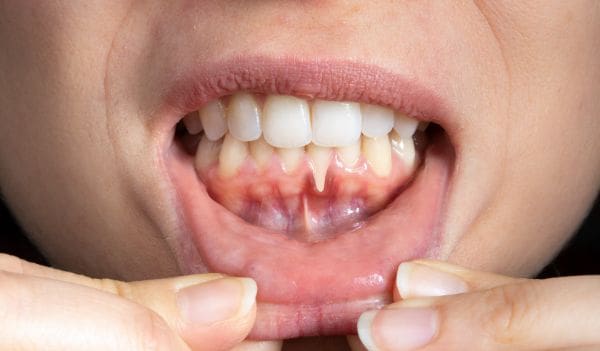A commitment to caring for your dental health is one of the most important decisions you’ll make in your life. Its common knowledge that brushing and interdental cleaning at least twice a day is a meaningful way to maintain the health of your teeth and mouth in general, but few people know exactly what they’re protecting their health from.
Cavity producing food such as sweets, smoking, and skipping brushing can negatively affect your dental health profoundly. Leaving these issues untreated will escalate into more severe problems that can potentially affect you permanently. One of the best known is gum disease.
What is Gum Disease?
Maintaining a daily cleaning regime will work wonders in removing the unwanted bacteria and preventing more significant issues from developing, such as gum disease.
Poor dental and oral hygiene will let the bacteria that collects throughout a typical day develop into dental plaque and become harmful to you. In addition, unclean teeth have a build-up of dental plaque that can accumulate along the gum line and make the gums themselves vulnerable to infection, bad breath and even loss of teeth.
Periodontal Disease
As your body fights the infection caused by the bacteria build-up, the gums will become painfully inflamed, and the bodily chemicals generated will damage the nearby teeth and gums. This is an example of a severe gum disease called Periodontal disease.
In addition to this painful infection, gum disease will inflict an unpleasant bad breath called Halitosis. Halitosis results from small decaying food particles getting stuck between your teeth and collecting bacteria. This collected bacteria releases chemicals such as sulfides, which create a terrible smell and gives the owner pungent breath.
Unfortunately, the symptoms of Periodontal disease are not apparent right away, and they only become readily visible once they have advanced to later stages. Halitosis is one of the main symptoms, but other symptoms include:
- Painfully inflamed gums which are receding or bleeding when brushing
- Loose or separating teeth
- Pus where your teeth and gums are connected
These reasons and more are why it’s highly recommended that you embrace the preventative measures of maintaining a high level of dental hygiene daily with simple brushing and flossing. Additionally, you can catch any problems before they develop by attending regular check-up appointments with your dentist..
How Gum Disease Escalates
There are four main stages of Periodontal disease that progress as your gum disease escalates.
Gingivitis is an initial stage of gum disease. This forms from plaque build-up around the teeth and is best recognised from bleeding gums. Most Gingivitis symptoms are painless, making it difficult to detect and preventing it in the first place essential.
Mild Periodontal disease is when the previously mentioned infection has settled into the bone. The disease begins to destroy the bone and teeth and requires an intensive cleaning to remove the destructive bacteria.
Moderate Periodontal disease is the escalation of the disease from attacking the infected bone and infecting the bloodstream.
Severe Periodontal disease is the last stage of the disease. This stage is categorised as when the bacteria has evolved into disease-causing bacteria. This stage’s symptoms are oozing pus, teeth being loose, pain when chewing, and even significant bone loss. If left untreated, you can lose teeth and potentially require replacement teeth, such as a set of dentures from our team in manchester.
The sooner Periodontal disease is treated, the quicker and easier it is to cure. So if you feel something is wrong, consider contacting one of our emergency dentists in Manchester to get treated as soon as possible.
Negative Health Effects
The mouth is the gateway to the rest of the body. Whatever issues your mouth may have will not stay limited to your mouth; it’s not long before it begins to harm your health elsewhere and in the most unexpected ways, for example:
Strokes increase when someone has gum disease. Arterial narrowing and heart disease develop when the bacteria enter the bloodstream through the gums. Additionally, blood clotting is increased due to the presence of bacteria.
Dementia has also been linked to gum disease. Researchers discovered that adults with tooth loss are at a higher risk of cognitive impairment associated with Alzheimer’s and Dementia. In addition, gum infections spread inflammatory substances that can cause brain inflammation and brain cell death.
Can Gum Disease Be Reversed?
When it comes to gum disease, prevention is always the right choice because, unfortunately, periodontal disease is a chronic, degenerative disease that is not currently curable. However, whilst it’s not reversible, it is manageable. So, with your dentist’s advice, you can limit the damage that gum disease causes as best you can.
It’s possible to reverse Gingivitis in the early stages. First, your dentist will perform a deep cleaning to remove the tartar on both the tooth and gums. Certain mouthwashes and saltwater rinses will also help remove this initial bacteria and prevent it from developing into Periodontal disease.
Expert Hygienist and Dentist Advice
At Bespoke Dental & Implant Clinic, we pride ourselves on helping people maintain the highest dental hygiene for their teeth and gums. With our team of private dentists in Manchester, we can offer the most advanced dentistry techniques in the world to make sure that our patients receive the highest quality results for their essential dental care.
If you feel any of the mentioned symptoms match how you’re feeling, consider getting yourself checked out by our expert emergency dentist in Manchester or consider booking your next check-up online today and let us help you avoid gum disease entirely with our invaluable advice on preventative measures.
